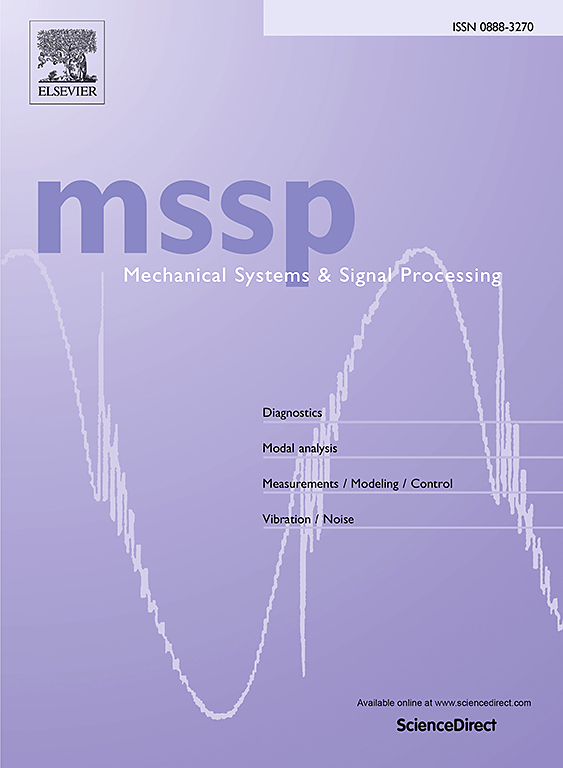Self-tuning vibration absorber based on model reference adaptive control
IF 8.9
1区 工程技术
Q1 ENGINEERING, MECHANICAL
引用次数: 0
Abstract
The performance of a tuned vibration absorber (TVA) is highly sensitive to its structural parameters, and even slight mistuning can significantly degrade its vibration suppression performance. However, structural parameter uncertainties caused by manufacturing tolerances, along with time-varying features such as parameter drift or abrupt changes due to aging or environmental variations, often result in TVA mistuning and degraded performance. Therefore, developing precise tuning strategies for TVAs with uncertain and time-varying structural parameters is of great importance, and further research is urgently needed in this area. To address this challenge, this paper proposes a self-tuning vibration absorber based on model reference adaptive control (MR-STVA), which possesses the ability to compensate for structural parameter uncertainty, drift, and abrupt changes − a capability we define as structural parameter adaptive compensation. First, an adaptive control law is developed using Lyapunov stability theory to ensure system stability. Then, a fixed Lyapunov matrix is constructed by leveraging the specific structure of the TVA, allowing MR-STVA to track dynamic reference models and maintain effective suppression of time-varying disturbances. Moreover, a non-uniform gain scaling strategy is proposed to suppress undesired variations in the adaptive control law and reduce energy consumption. A series of experiments are conducted on a custom-built platform, including: (1) self-tuning under structural parameter uncertainty, (2) self-tuning under abrupt stiffness changes, (3) adaptive vibration absorption under time-varying excitations, and (4) convergence performance evaluation. Results verify the effectiveness and practical feasibility of MR-STVA under complex and variable operating conditions.
基于模型参考自适应控制的自调谐减振器
调谐减振器的性能对其结构参数非常敏感,即使是轻微的失谐也会显著降低其抑振性能。然而,制造公差引起的结构参数不确定性,以及老化或环境变化引起的参数漂移或突变等时变特征,往往导致TVA失调和性能下降。因此,研究具有不确定性和时变结构参数的tva的精确调谐策略具有重要意义,迫切需要在该领域进行进一步的研究。为了解决这一挑战,本文提出了一种基于模型参考自适应控制(MR-STVA)的自调谐减振器,该减振器具有补偿结构参数不确定性、漂移和突变的能力,我们将这种能力定义为结构参数自适应补偿。首先,利用李雅普诺夫稳定性理论建立了自适应控制律以保证系统的稳定性。然后,利用TVA的特定结构构造一个固定的Lyapunov矩阵,使MR-STVA能够跟踪动态参考模型并保持对时变干扰的有效抑制。此外,提出了一种非均匀增益缩放策略,以抑制自适应控制律的不良变化,降低能量消耗。在定制平台上进行了一系列实验,包括:(1)结构参数不确定性下的自调谐,(2)刚度突变下的自调谐,(3)时变激励下的自适应振动吸收,以及(4)收敛性能评估。结果验证了该方法在复杂多变工况下的有效性和实际可行性。
本文章由计算机程序翻译,如有差异,请以英文原文为准。
求助全文
约1分钟内获得全文
求助全文
来源期刊

Mechanical Systems and Signal Processing
工程技术-工程:机械
CiteScore
14.80
自引率
13.10%
发文量
1183
审稿时长
5.4 months
期刊介绍:
Journal Name: Mechanical Systems and Signal Processing (MSSP)
Interdisciplinary Focus:
Mechanical, Aerospace, and Civil Engineering
Purpose:Reporting scientific advancements of the highest quality
Arising from new techniques in sensing, instrumentation, signal processing, modelling, and control of dynamic systems
 求助内容:
求助内容: 应助结果提醒方式:
应助结果提醒方式:


